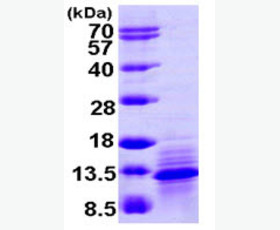Recombinant Human Cyclin-Dependent Kinase 6/CDK6
| Product name: | Recombinant Human Cyclin-Dependent Kinase 6/CDK6 |
| Source: | E.coli |
| Purity: | Greater than 95% as determined by reducing SDS-PAGE. |
| Buffer Formulation: | Supplied as a 0.2 μm filtered solution of 50mM Tris, 100mM NaCl, 20% Glycerol, 5mM DTT, pH 8.0. |
| Applications: | Applications:SDS-PAGE; WB; ELISA; IP. |
| Storage: | Avoid repeated freeze/thaw cycles. Store at 2-8 oC for one month. Aliquot and store at -80 oC for 12 months. |
| UOM: | 100ug/50ug/200ug/1mg/1g |
| Source | E.coli |
| Description | Recombinant Human Cyclin-Dependent Kinase 6 is produced by our E.coli expression system and the target gene encoding Met1-Ala326 is expressed with a 6His tag at the N-terminus. |
| Names | Cyclin-Dependent Kinase 6, Cell Division Protein Kinase 6, Serine/Threonine-Protein Kinase PLSTIRE, CDK6, CDKN6 |
| Accession # | Q00534 |
| Formulation | Supplied as a 0.2 μm filtered solution of 50mM Tris, 100mM NaCl, 20% Glycerol, 5mM DTT, pH 8.0. |
| Shipping |
The product is shipped on dry ice/ice packs. |
| Storage |
Store at < -20°C, stable for 6 months after receipt. Please minimize freeze-thaw cycles. |
| Biological Activity |
IN STOCK |
| Purity |
Greater than 95% as determined by reducing SDS-PAGE. |
| Endotoxin | Less than 0.1 ng/µg (1 IEU/µg) as determined by LAL test. |
| Amino Acid Sequence |
MGSSHHHHHHSSGLVPRGSHMEKDGLCRADQQYECVAEIGEGAYGKVFKARDLKNGGRFVALKRV RVQTGEEGMPLSTIREVAVLRHLETFEHPNVVRLFDVCTVSRTDRETKLTLVFEHVDQDLTTYLD KVPEPGVPTETIKDMMFQLLRGLDFLHSHRVVHRDLKPQNILVTSSGQIKLADFGLARIYSFQMA LTSVVVTLWYRAPEVLLQSSYATPVDLWSVGCIFAEMFRRKPLFRGSSDVDQLGKILDVIGLPGE EDWPRDVALPRQAFHSKSAQPIEKFVTDIDELGKDLLLKCLTFNPAKRISAYSALSHPYFQDLER CKENLDSHLPPSQNTSELNTA
|
| Background | Cyclin-Dependent Kinase 6 (CDK6 belongs to the CMGC Ser/Thr protein kinase family and CDC2/CDKX subfamily. CDK6 is expressed in many tissues and contains one protein kinase domain. This cyclin forms a complex with and functions as a regulatory subunit of CDK4 or CDK6, whose activity is required for cell cycle G1/S transition. Mutations and overexpression of CDK6, which alters cell cycle progression, are observed frequently in a variety of tumors and may contribute to tumorigenesis. |














